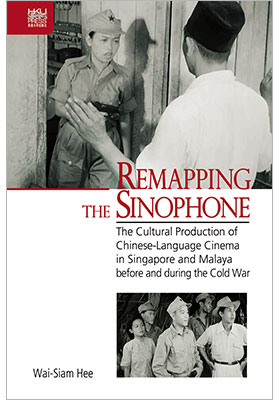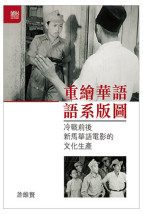Remapping the Sinophone
The Cultural Production of Chinese-Language Cinema in Singapore and Malaya before and during the Cold War
(重繪華語語系版圖:冷戰前後新馬華語電影的文化生產)
ISBN : 978-988-8528-03-5
Crossings: Asian Cinema and Media Culture 跨越:亞洲電影與媒體文化
November 2019
252 pages, 6″ x 9″, 28 b&w illus.
- HK$540.00
Ebooks
In a work that will force scholars to re-evaluate how they approach Sinophone studies, Wai-Siam Hee demonstrates that many of the major issues raised by contemporary Sinophone studies were already hotly debated in the popular culture surrounding Chinese-language films made in Singapore and Malaya during the Cold War. Despite the high political stakes, the feature films, propaganda films, newsreels, documentaries, newspaper articles, memoirs, and other published materials of the time dealt in sophisticated ways with issues some mistakenly believe are only modern concerns. In the process, the book offers an alternative history to the often taken-for-granted versions of film and national history that sanction anything relating to the Malayan Communist Party during the early period of independence in the region as anti-nationalist.
Drawing exhaustively on material from Asian, European, and North American archives, the author unfolds the complexities produced by British colonialism and anti-communism, identity struggles of the Chinese Malayans, American anti-communism, and transnational Sinophone cultural interactions. Hee shows how Sinophone multilingualism and the role of the local, in addition to other theoretical problems, were both illustrated and practised in Cold War Sinophone cinema. Remapping the Sinophone: The Cultural Production of Chinese-Language Cinema in Singapore and Malaya before and during the Cold War deftly shows how contemporary Sinophone studies can only move forward by looking backwards.
‘Sound and refreshingly original. Remapping the Sinophone is an important book that will change the ways in which scholars tackle Sinophone studies, and it will exert profound influence on related scholarship published in both the Sinophone and the Anglophone world.’ —Shu-mei Shih, UCLA / The University of Hong Kong
‘Remapping the Sinophone offers a fresh perspective to Sinophone studies by mapping out the relevance of early Chinese-language cinema in Singapore and Malaya to the burgeoning field. Wai-Siam Hee’s examination of this lesser known cultural history in Southeast Asia through the critical lens of the Cold War is a necessary intervention to our understanding of Sinophone Cinema as a pluralistic form.’ —E. K. Tan, SUNY Stony Brook
‘This monograph makes a significant contribution to Sinophone studies through its investigation of the relationships among Sinitic-language cultural production, historical experiences of overseas Chinese in Southeast Asia, and the imaginary homeland (China proper). Remapping the Sinophone complicates Shu-mei Shih’s definition of Sinophone by examining the depictions of “Chineseness” in Malayan and Singaporean films made before and during the Cold War period. It not only addresses the omission of film in the scholarship on Southeast Asian Sinophone cultural production, which has primarily focused on literary texts after 1960, but also expands the scope of Sinophone cinema studies, which have been limited to works from Taiwan, Hong Kong, and Anglophone regions outside Asia. Wai-Siam Hee contests the epistemology of the term “Sinophone,” which is deployed to question Euro-American colonialism and neocolonialism, China-centrism, diaspora, and national identity. Culling through declassified documents, archives, newspapers, tabloids, magazines, and other print media, Hee contends that heterogeneous “Chinese-language cinemas” had already appeared in Singapore and Malaya during the Cold War period. This book studies the way multilingual Chinese films were disseminated as a powerful form of cultural production, popular memory, and propaganda in Malaya and Singapore from 1926 to 1965... Hee’s research into the forgotten history of Southeast Asian cinema is a commendable and crucial intervention into the field of Sinophone studies. His research not only unsettles the notion of heteroglossia in multilingual Chinese cultural practices compromised by political hegemonies. But it also foregrounds the perennial tension between Sinophone cultural production and theorization.’ —Chialan Sharon Wang, The Journal of Asian Studies




